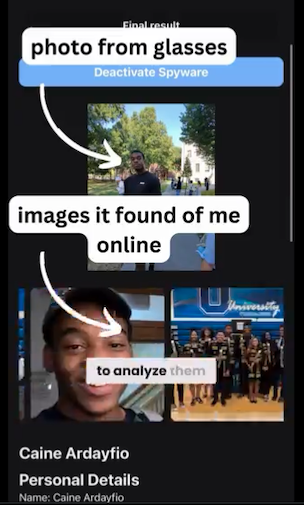Ditch the spy glasses and shun the Zuckholes
About a year ago I spoke with Kashmir Hill on Techtonic about her book Your Face Belongs to Us, which tells the history of facial recognition. The latest iteration of the technology is the Clearview AI app, which allows for real-time identification of nearly any human face: just point a smartphone camera at someone and up comes their name, social accounts, friends, and photos from their past. So far, in the US, only law enforcement and intelligence agencies are allowed to use the app.
The consequences of such a tool are chilling. Anywhere you go, your entire past – as represented by the internet and social media – is available to anyone with access to that app. I wrote a column, Facial recognition and the end of privacy (Nov 2, 2023), with this warning:
Once this technology is adopted throughout society, there will be no escape.
Unfortunately, there were two indications recently that live facial recognition is continuing to spread.
First, a 404 Media article that got a lot of attention: Someone Put Facial Recognition Tech onto Meta's Smart Glasses to Instantly Dox Strangers (by Joseph Cox, Oct 2, 2024). Harvard students wrote an app to use the images from Mark Zuckerberg's Ray-Ban surveillance glasses to identify nearby people. As the article puts it:
The demo video posted to X on Tuesday shows the pair using the tech against various people. In one of the first examples, Ardayfio walks towards the wearer. “To use it, you just put the glasses on, and then as you walk by people, the glasses will detect when somebody’s face is in frame,” the video says. “After a few seconds, their personal information pops up on your phone.”
If you don't mind using X/Twitter, the video is really worth watching. It shows real-world examples of someone being identified by the spy glasses in real time, allowing the users to pretend that they know the person. Really creepy:

The second indication of facial rec spread came in my Techtonic interview this week: I spoke with Silkie Carlo, director of London-based Big Brother Watch, about the growing surveillance state in the UK. One of the first things she pointed out is the widespread use, in train stations and other public spaces, of live facial recognition.
Dismantling the surveillance state is going to take years, decades even, as citizens begin to stand up for their civil rights. It's work that must be done, assuming we want to live in a democracy, and I wish Carlo and Big Brother Watch all success.
In the meantime, there's something everyone can do. Ditch the spy glasses – don't go anywhere near a Ray-Ban with embedded cameras – and if you do happen to see someone wearing the surveillance glasses, pointed in your direction, ask them to turn them off. We managed to deter the "glassholes" 12 years ago when Google Glass first appeared; now it's time to shun the Zuckholes.
If you'd like to join in a community of people concerned about the overreach of intrusive surveillance and other Big Tech platforms, please join Creative Good.
Other threads on the Forum this week, for Creative Good members:
- Roblox is accused of lying and harming kids (thread contains pointers to past Roblox revelations on the Forum)
- Forced arbitration via terms of service, a new troubling trend that I should write more about – companies stripping rights from users
- Smartphones outside Big Tech, a new Good Reports thread evaluating non-Big Tech smartphones
- Robot vacuums that can be hacked, with current and past reports of vacuums' surveillance data being leaked online
To get access to these and hundreds of other resources, join Creative Good.
Until next time,
Mark Hurst, founder, Creative Good
Email: mark@creativegood.com
Podcast/radio show: techtonic.fm
Follow me on Bluesky or Mastodon